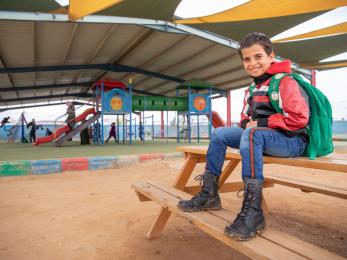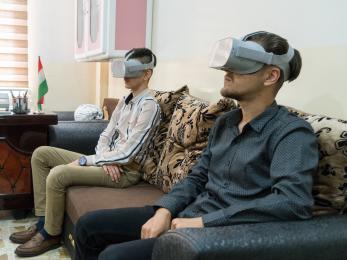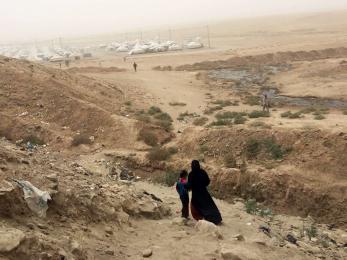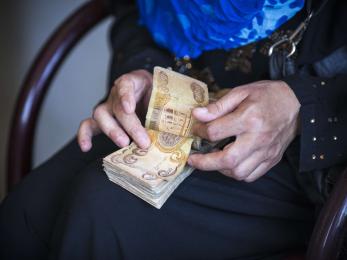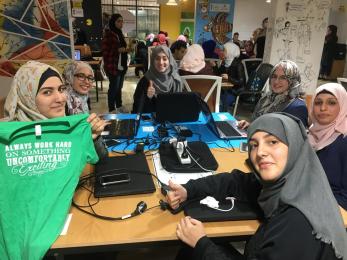Breadcrumb
Iraq
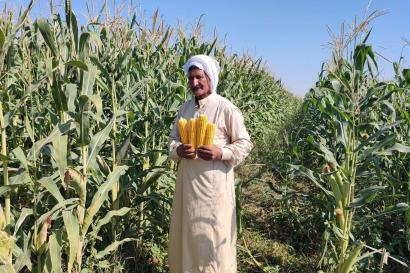
Since 2003, Mercy Corps has been working to pave the way for a more resilient and peaceful Iraq. In 2023, we reached over 400,000 people across the country.
The context
Iraq’s history of military conflict, ethno-religious divisions, and political instability combined with climate disasters like earthquakes, floods, and sandstorms have exacerbated violent competition over diminishing resources. Yet between each crisis lies a crucial point of transition in which Iraq has the opportunity to break this cycle and move towards a stable and prosperous future.
While Islamic State of Iraq and Syria (ISIS) was defeated in 2017, Iraq continues to grapple with the effects of the conflict. Since January 2014, Iraq has experienced massive displacement and humanitarian needs due to the growth of ISIS, its capture of territories, and the extensive military campaign intended to defeat it. In a country of 38 million, ISIS’ control, which reached its height in the fall of 2014, displaced six million people and left more than 11 million people in need of humanitarian assistance. The conflict has led to an estimated 2.5 million people in Iraq who are still in need of humanitarian assistance. Of the six million people who were forced to flee their homes, 4.8 million displaced people have returned, while 1.1 million people remain displaced. Moreover, humanitarian needs remain for over 272,000 refugees who fled Syria during conflict and still live in Iraq.
Amidst these challenges, Iraqi people have demonstrated an ability to rise again and again from crisis. Over the years, Mercy Corps has continuously pivoted—both geographically and programmatically—to respond to the needs of communities across the country. In this evolving landscape, the nation is transitioning from humanitarian aid to development programmes to meet the changing needs of communities throughout the country.
Our impact
Mercy Corps supports people in Iraq to access the resources and knowledge needed to cope more effectively with crises, recover quicker, and build more sustainable solutions in the face of future challenges. We deliver assistance to address immediate needs while also working closely with communities to tackle longer-term peace and development challenges. Through our programme activities we are making an impact across the areas below:
Increasing economic opportunities
Through diverse initiatives, Mercy Corps fosters economic resilience, supports livelihood development, and strengthens agricultural market chains. Mercy Corps provides vocational training for participants to learn skills to obtain employment and supports households and small businesses to have access to critical goods and services such as cash, savings, loans, and other assistance to achieve long-term financial independence. We work with local governments, financial institutions, and private sector actors to strengthen financial systems.
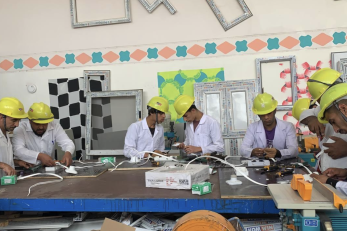
In more rural areas, Mercy Corps is helping to rebuild the agricultural economy by supporting the local market systems. Our programmes provide access to financial products and services, improved irrigation systems, and training to reestablish farming activities. By creating opportunities for growth and inclusivity, Mercy Corps aims to uplift communities and pave the way for a more self-reliant future.
Strengthening governance and social stability
Mercy Corps is working to build bridges across divisions and address drivers of conflict within communities. By engaging with young people through initiatives that create opportunities to actively participate in decision-making processes, peacebuilding activities, and community development efforts, local communities are harnessing the energy and ideas of young people. Mercy Corps promotes social inclusion, amplifies youth voices, and builds bridges for positive change in Iraq's path to peace and good governance.
For example, Mercy Corps supports women-led organisations who advocate for gender-responsive conflict mediation to address harmful gender norms and power dynamics that may escalate to violent extremism. Mercy Corps creates platforms for dialogue and collaboration to strengthen peace efforts and governance structures in Iraq. These projects work toward elevating human rights, promoting social cohesion, and fostering lasting peace.
Delivering access to clean water and sanitation services
Iraq faces a water crisis across the country. Mercy Corps addresses critical water needs through providing water, sanitation, and hygiene support (WASH). At the Debaga camp, where 7,500 internally displaced people reside, Mercy Corps is the sole provider of water and sanitation services.
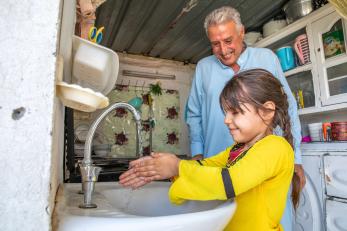
Mercy Corps partners with communities and local governments for more sustainable WASH solutions, through collaborative natural resource management and building climate resilient solutions. As part of our focus on providing long-term WASH solutions, we work with local governments to implement and maintain access to clean drinking water and sanitation services by transferring Mercy Corps-led WASH services to local leadership.

